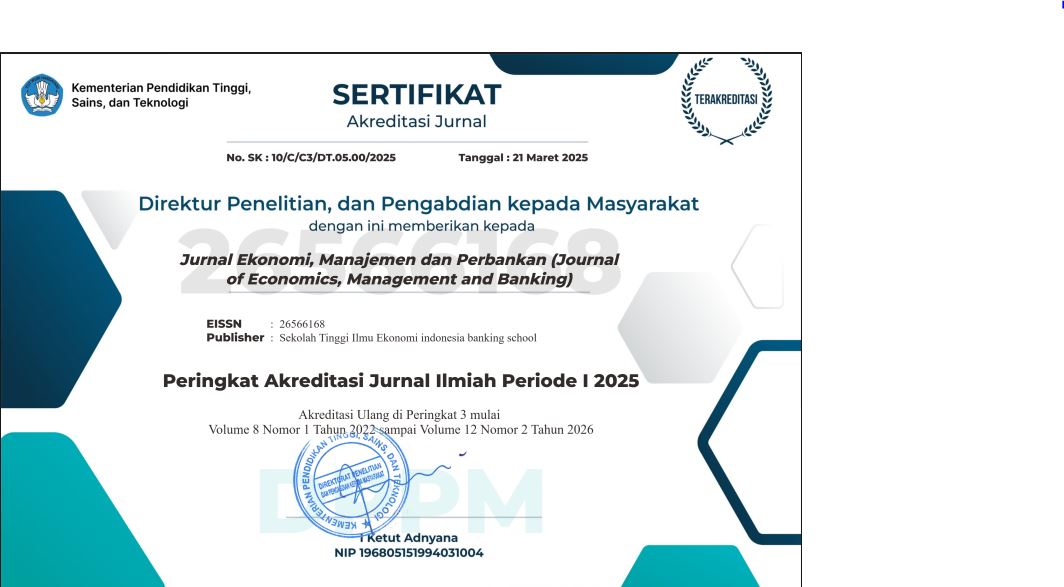The Effect of Employee Performance Improvement Based on the Influence of Leader-ship on Organizational Culture and Work Motivation through Work Discipline ( Stud-ies on Employees of PT. X Branch of ABC Airport)
DOI:
https://doi.org/10.35384/jemp.v7i2.254Keywords:
Leadership, Organizational Culture, Work Motivation, Work Discipline, Employee PerformanceAbstract
The purpose of this research is to investigate the influence of leadership, organizational culture, work mo-tivation, and work discipline on improving employee performance. The research method used is a surveyed with a causal descriptive analysis technique. Collecting data using the questionnaire method with Likert Scale model, and there are 145 respondents as sample of this research. The analysis technique is using Structural Equation Modeling (SEM). The results of this study indicate that: 1) leadership has a significant effect on organizational culture, 2) organizational culture has a significant effect on work discipline, 3) leadership has a significant effect on job motivation, 4) work motivation has a significant effect on work discipline, 5) work discipline has a significant effect on employee performance, 6) leadership does not sig-nificant influence on employee performance, 7) organizational culture has a significant effect on employee performance through work discipline, and 8) work motivation has a significant effect on employee perfor-mance through work discipline.References
Deal, T.E., and Kennedy, A.A. (2000). Corporate Cultures: the Rites and Rituals of Corpo-rate Life. Cambridge: Perseus Publishing.
Dwitya Damayanti., and Mahendra Fakhri (2014). The Effect of Organizatin Culture on Work Discipline in PT Angkasa Pura II (Persero) Main Branch Office Soekarno-Hatta Interna-tional Airport Division Personnel & General Affairs. Jurusan Administrasi Bisnis. Telkom University.
Elkins, T. K and Keller, R. T. (2003). Leadership in Research and Development Organizations: A Literature Review and Conceptual Frame-work, Leadership Quarterly. Department of Management. University of Houston, USA Vol. 14.Issue 4/5, p587-606.
Ernawan, Erni R. (2011). Budaya Organisasi Da-lam Perpektif Ekonomi Dan Bisnis (Cetakan Kesatu). Bandung: Alfabeta.
Gibson, J. L., J. M. Ivancevich, dan J. H. Donnely. (2003). Organisasi (Perilaku, Struktur dan Proses). Edisi kelima. Jakarta: Erlangga.
Gordon, J.R. (2002). Organizational Behavior: A Diagnostic App
Ivancevich J.M., Konopaske, R., dan Matteson, M.T. (2005). Organizational Behavior and Management. Boston: McGraw Hill.
Kuranchie-mensah, E.B. & Amponsah-tawiah, K. (2016). Employee Motivationand Work Per-formance : A Comparative Study of Mining Companies in Ghana.
Ritchie, M. (2000). Organizational Culture: An Ex-amination of Its Effect on the Internalization Process and Member Performance. Southern Business Review, Vol. 25, Issues. 2. 1–13.
Rivai, Vethzal & Basri. (2005). Peformance Ap-praisal: Sistem yang tepat untukMenilai Kinerja Karyawan dan Meningkatkan Daya Saing Perusahan. Jakarta:PT. RajaGrafindo Persada.
Sugiyono. (2009). Metode Penelitian Kuantitatif, Kualitatif dan R&D. Bandung: Alfabeta.
Sutarto. (1998). Dasar-Dasar Kepemimpinan Ad-ministrasi, Yogyakarta: Gajah Mada Univer-sity Press.
Downloads
Published
Issue
Section
License
Authors who publish with this journal agree to the following terms:
- Authors retain copyright and grant the journal right of first publication with the work simultaneously licensed under a Creative Commons Attribution License that allows others to share the work to acknowledge the work's authorship and initial publication in this journal.
- Authors can enter into separate, additional contractual arrangements for the non-exclusive distribution of the journal's published version of the work (e.g., post it to an institutional repository or publish it in a book) with an acknowledgment of its initial publication in this journal.
- Authors are permitted and encouraged to post their work online (e.g., in institutional repositories or on their website) before and during submission. It can lead to productive exchanges and earlier and greater citation of published work.















